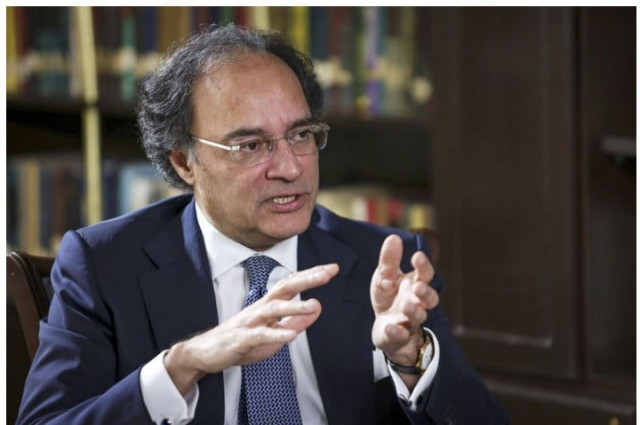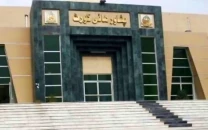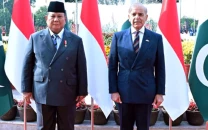Economic Survey 2023-24: Aurangzeb highlights GDP contraction, urgent need for IMF programme
Finance czar presents pre-budget document detailing country's socioeconomic milestones for the outgoing fiscal year

The Economic Survey of Pakistan 2023-24, a pre-budget document detailing the country's major socio-economic achievements during the outgoing fiscal year, has been launched. Finance Minister Muhammad Aurangzeb presented the survey.
Aurangzeb highlighted that during the financial year 2022-23, Pakistan's GDP contracted, and the rupee depreciated by 29%. He stressed the necessity of entering the IMF programme, describing it as the lender of last resort. "We must go with IMF as there is no plan B," he said.
The government has renewed its focus on high-potential sectors such as IT, SMEs, mines and minerals, tourism, exports, and agriculture. Aurangzeb noted that without the IMF, the situation would have been significantly different. He emphasised the need to secure the next IMF loan programme, acknowledging the challenges faced by the large-scale manufacturing (LSM) sector due to inflation and high energy rates.
Aurangzeb highlighted agriculture's positive performance, with a bumper crop contributing significantly to GDP growth. He pointed out that recent years have been marked by persistent challenges since FY 2022.
Revenue collection grew by an unprecedented 30% during the fiscal year, which Aurangzeb attributed to the provinces delivering surpluses, enabling the achievement of the IMF's nine-month standby arrangement. He noted that the economy embarked on a stabilisation phase in FY 2024, with nearly 30% growth in revenue from the Federal Board of Revenue (FBR) and provincial growth aiding the federation.
The current account deficit (CAD) was projected to be around $6 billion in FY24, but estimates now suggest it will be less than $1 billion by the end of the fiscal year on June 30, potentially as low as $200 million. Workers' remittances at $3.2 billion are expected to keep the current account in surplus for the full fiscal year.
Aurangzeb credited the government's administrative steps for curbing smuggling and misuse of Afghan transit trade. He praised the State Bank of Pakistan (SBP) for its role in stabilising the rupee by phasing out weak exchange companies and supporting banks to open exchange companies, marking a structural change.
The economy has experienced moderate growth and a reduction in external pressures. Aurangzeb assured that speculative activity would not revive in the rupee-dollar market, citing administrative measures taken by the SBP.
"We have foreign exchange reserves of $9 billion, providing cover for two months of imports," he said. Aurangzeb stressed the importance of the IT sector in driving economic growth and improving citizens' quality of life through digital transformation.
Aurangzeb highlighted the need for investment as a primary driver of economic growth, noting that Pakistan's investment rate is relatively low and declining. He reported a drop in core inflation to 11.8% in May and a reduction in food inflation, with expectations of monetary easing.
The services sector has maintained the largest share of GDP at 58% for several years. Aurangzeb expressed optimism about the monetary policy, predicting a single-digit policy rate in the next fiscal year.
Discussions with the IMF were described as productive and constructive. Aurangzeb reported an 11.6% increase in wheat production, reaching 31.44 million tonnes compared to 28.16 million tonnes last year.
After approval by Prime Minister Shehbaz Sharif, the budget will be presented tomorrow. Aurangzeb noted that the GDP contracted by 0.2% in 2023.
The press conference concluded, and a question-and-answer session began.
Aurangzeb stated that the rupee depreciated by 26% in 2023, and agriculture, particularly bumper crops, was a saviour for the economy. He emphasised the necessity of policy enforcement in the tax and power sectors. "We have to enforce the tax policies which we are unable to do right now," he said.
Responding to a question, Aurangzeb acknowledged that the government must address leakages in tax collection, as the track and trace system did not meet expectations. "Leakages are to be controlled first. The FBR achieved 30% growth in revenue collection. Track and trace did not work. There are no sacred cows… everyone has to contribute towards the economy."
He stated that corporate governance in DISCOs will be improved with the inclusion of private sector professionals. He also mentioned that the first three months of the fiscal year saw a current account surplus, and power theft is estimated at Rs500 billion.
Aurangzeb confirmed that DISCOs would not remain in the public sector, emphasising plans for their privatisation. "DISCOs are to be privatised… we achieved currency stability in the last few months," he said. "Sovereign commitments are respected. After taking everyone on board, we must resolve issues."
He noted that the fiscal deficit stood at 37% of GDP during the first three quarters.
State Minister for Finance Ali Pervez Malik, accompanying Aurangzeb, said that capacity payments would reduce with increased power consumption from the grid. "The population growth rate stood at 2.55%."
With reforms and improved electricity consumption, the burden of capacity charges will reduce, Malik added. He stated that power load-shedding is being conducted to control circular debt. "We have adequate electricity generation capacity," he said.
Aurangzeb addressed the issue of overbilling, a major complaint, and promised improvements. "You would soon hear good news in the power sector," he said.
He noted that the investment-to-GDP ratio for FY24 remained at 13.14%, with private and public investment growing by 15.8% and 18.2%, respectively. Regarding the agricultural sector, he stated that agriculture will remain a critical pillar of growth.
"The IMF programme is all about stabilisation," Aurangzeb said. "Agriculture and IT have nothing to do with the IMF; these are under our control."
Replying to a question, Aurangzeb reiterated that while the IMF programme focuses on stabilisation, sectors like agriculture and IT are independent and under government control. "We have to improve productivity," he said.
Aurangzeb credited Prime Minister Shahbaz Sharif with starting the economic recovery and highlighted the potential in the export of livestock and dairy. He expressed confidence in the necessity of the IMF programme.
He mentioned the HBL agriculture programme aimed at reducing the role of middlemen and praised the government's signing of the nine-month standby arrangement as a brave step. "I believe in agriculture," Aurangzeb said, adding that the government must end its role in the sector.
Plans to restructure PASSCO, the wheat procurement company, were announced. Aurangzeb gave the example of rice, where exports have surged this year, advocating for lesser government intervention and a greater role for the private sector in agriculture.
Aurangzeb reported 1.25% growth in the industrial and services sectors and emphasised the importance of enforcement measures in achieving a 30% increase in tax collection. "We have to end leakages to achieve our targets," he said.
He assured that speculative activity in the exchange rate market has been controlled and shared that his recent trip to China focused on the second phase of the China-Pakistan Economic Corridor (CPEC), emphasising a business-to-business agenda.
Aurangzeb noted that the end of the global commodity cycle and enforcement measures in Pakistan have resulted in reduced inflation. Domestic fertiliser production increased by 17.3%, and inflation is expected to decrease to 5-7% by 2025-26.
He acknowledged that some decisions by the National Economic Council (NEC) had been reversed and noted an increase in per capita income to $1,680 from $1,551 last year. Aurangzeb expressed confidence in managing foreign debt repayment, expecting rollovers and some commercial bank borrowing. "Debt repayment is not going to be an issue next fiscal year," he said.
Aurangzeb announced that commercial bank borrowings are returning, having had an initial meeting after returning from the UAE. "We are very keen to go for the inaugural Panda bonds in the next fiscal year," he said.
He mentioned that Deputy Prime Minister and Foreign Minister Ishaq Dar had raised two questions before the IMF. "We did not wait for the budget and other things, but opted to digitalise the FBR and hired an international firm for digitalisation to reduce human intervention in the FBR."
Aurangzeb noted that all central banks globally have agreed to raise rates if inflation increases again. "There is no harm in dialogue; all central banks are clear that if inflationary pressure slips in, they will jack up rates."
He emphasised the need for FBR data to be used for analytics rather than field data, with notices issued through a centralised digital system, reserving human intervention for checking velocity. He lauded the caretaker government for its role in PIA's privatisation. "The caretaker government did well in terms of pushing ahead with PIA's privatisation, and we will hopefully see results by July."
Aurangzeb said the ongoing PIA due diligence is expected to be completed by July or August. "Once this transaction is done, we will proceed to the Islamabad airport transaction. We have received bids for outsourcing Islamabad Airport and will not stop here," he said.
The federal government must collaborate with provincial governments, he stressed. Regarding State-Owned Enterprises (SOEs), Aurangzeb stated that the PIA transaction is progressing as the government cannot sustain a Rs1 trillion deficit. He also confirmed that there is no chance for the revival of Pakistan Steel Mills, which will be sold for scrap.
Aurangzeb highlighted the success of the banking sector, particularly the National Bank, and mentioned that he is chairing SOEs. A filter system has been created for projects under the Public Sector Development Programme (PSDP), prioritising those with significant economic impact.
The finance minister stated that while the government has many unfunded projects, it will only pursue those with a significant economic impact. New projects initiated will similarly aim for major economic benefits.
Malik emphasised that investments stem from savings. “We have to change the direction of the economy towards saving to increase investment,” he added.
Aurangzeb explained that the National Economic Council (NEC) is a strategic forum headed by the prime minister, including chief ministers of provinces and other ministers. He suggested that the NEC should meet quarterly, rather than just once a year, to review performance and set targets.
"We have introduced the public-private partnership model for the first time and will strictly enforce it," he said.
Budget 2024-25
This survey precedes the federal budget for the fiscal year 2024-25, set to be presented on June 12 (Wednesday).
Officials and analysts indicate that the coalition government, led by the Pakistan Muslim League-Nawaz (PML-N), plans to set ambitious fiscal targets in the Budget 2024-25 to bolster its case for a new bailout deal with the International Monetary Fund (IMF).
Acknowledging severe financial constraints and reduced development funding under the IMF programme, the Annual Plan Coordination Committee (APCC) has recommended Rs1,221 billion for the federal development programme for the financial year 2024-25.
This will be the first budget presented by the current government. As Pakistan seeks a loan programme to avoid default in a sluggish economy, the IMF has urged the country to raise provincial taxes, particularly on agriculture, sales tax on services, and property tax.
Pakistan is negotiating with the IMF for a loan estimated between $6 billion to $8 billion to prevent a default in an economy that is growing at the slowest pace in the region.
Pakistan narrowly avoided default last summer thanks to a short-term IMF bailout of $3 billion over nine months. While fiscal and external deficits have been controlled, this has led to a sharp decline in growth and industrial activity, coupled with high inflation, which averaged close to 30% in the last financial year and 24.52% over the last 11 months.
The growth target for the upcoming year is expected to be 3.6%, compared to 2% this year and economic contraction last year.
Since being elected in the February 8 general elections, Premier Shehbaz has publicly committed to tough reforms. However, high prices, unemployment, and a lack of new job opportunities have put political pressure on his coalition government.
Another critical aspect of the budget will be the targets set for proceeds from privatisation.
Pakistan aims to make its first major sale in nearly two decades by selling a stake in its national airline. This is expected to be the first in a series of sales of loss-making entities, particularly in the troubled power sector.



















COMMENTS
Comments are moderated and generally will be posted if they are on-topic and not abusive.
For more information, please see our Comments FAQ